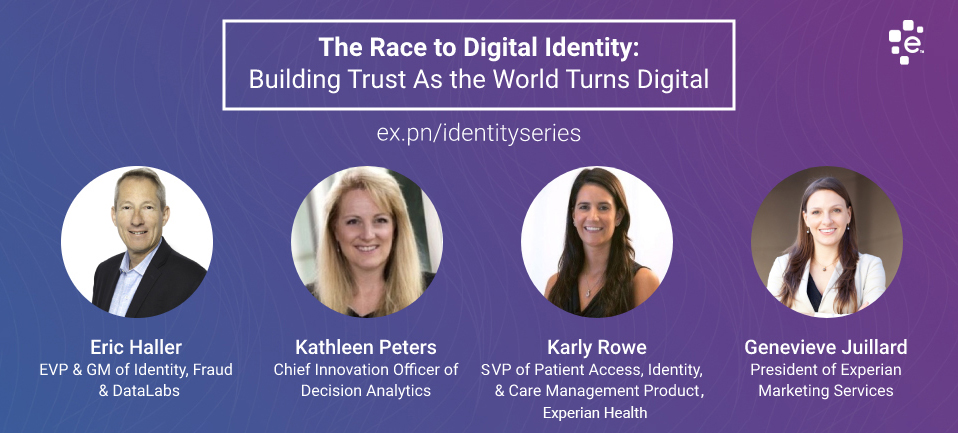Identity & Fraud
Experian uses data and the most advanced technologies to meet and keep up with the needs of its consumers, making us a leader in identity verification and fraud detection and prevention. Read about our latest identity and fraud news below:

Today we released our annual Future of Fraud Forecast to help consumers and businesses stay one step ahead of emerging fraud trends and scams. Here’s what we expect in 2023: Fake texts from the boss: Given the prevalence of remote work, Experian predicts there’ll be a sharp rise in employer text fraud. This occurs when the “boss” texts the employee to buy gift cards using a bogus reason, and then asks the employee to email the gift card numbers and codes. Fraudsters then use the gift cards, leaving the employee and/or the company with the expense.Beware of fake job postings and mule schemes: Amid uncertain economic conditions, Experian predicts fraudsters will create fake remote job postings, specifically designed to lure consumers into applying for the job and providing private details like a social security number and date of birth on a fake employment application. The job never materializes, and the fraudsters use the information provided to commit identity theft. Experian also predicts that consumers could fall prey to mule recruiting schemes. This happens when people sign up for work from home jobs and unintentionally act as a re-shipper of stolen goods or help move money through their personal bank accounts on behalf of fraudsters.Frankenstein shoppers spell trouble for retailers: Synthetic identity fraud is the fastest growing financial crime in the United States, according to The Federal Reserve. This type of fraud involves a fraudster creating a synthetic or “Frankenstein” identity by combining real and false information and opening and building up lines of credit, eventually maxing out their credit limit and never paying it back. Experian predicts a new version of this fraud could result in major losses for retailers in the coming year. Fraudsters can create online shopper profiles using synthetic identities so that the fake shopper’s legitimacy is created to outsmart retailers’ fraud controls. As the shopper’s profile matures, criminals add stolen payment cards to the accounts. When the fraud eventually occurs, a single synthetic identity will have multiple credit lines to burn through across retailers.Social media shopping fraud: Experian predicts in-app social commerce fraud could result in millions of dollars in losses. These apps are designed to make shopping easy, intuitive and compelling for consumers to make purchases without leaving the app. This means legitimate brands are racing to make social commerce a part of their sales strategy. However, social commerce currently has very few identity verification and fraud detection controls in place, making the retailers that sell on these platforms easy targets for a surge in fraudulent purchases.Peer-to-peer payment problems: Consumers love the convenience of peer-to-peer payments and usage continues to grow. Fraudsters also love peer-to-peer payment methods because they’re an instantaneous and irreversible way to move money, enabling fraudsters to get cash with less work and more profit. Experian predicts fraudsters will gain even more unauthorized access to peer-to-peer payments by using multiple social engineering techniques. Consumers will be duped into buying fake items, sending the money to fraudsters and then never receiving their orders. They’ll also be tricked into giving their account credentials, enabling fraudsters to send cash to themselves. Experian is at the forefront of fraud prevention and identity verification. We offer a full suite of automated tools that harness data and analytics to prevent fraud and mitigate losses. Learn more about Experian’s fraud prevention tools here.

As any online merchant knows, the past few years have seen a rapid increase in digital transactions but unfortunately, fraudsters have adapted quickly and taken advantage of this. With booming online sales, retailers strive to provide a seamless shopping experience while simultaneously recognizing legitimate customers and keeping an eye out for fraud. It’s a balancing act that becomes more perilous as transaction volumes grow. Perhaps one of the most frustrating challenges for online merchants is false declines. In fact, Aite-Novarica Group’s The E-Commerce Fraud Enigma: The Quest to Maximize Revenue While Minimizing Fraud Report found the average false decline rate is 1.16%. With over $960 billion in U.S. online sales in 2021, lost sales resulting from false declines is substantial, totaling more than $11 billion. False declines occur when a good customer is suspected of fraud and then prevented from completing a purchase. This happens when a company’s fraud prevention solution provides inadequate insight into the identity of the customer, flagging them as a potential bad actor. The result is a missed sale for the business and a frustrating transaction and experience for the customer. Merchants use a variety of tools to prevent fraud while ensuring they minimize friction during the purchase experience, but many legacy fraud solutions fail to provide the confidence needed to sufficiently assess the risk of the identity presented by the customer. As identities become more complex, Experian recognizes that identity is personal. We are committed to creating new and innovative solutions to manage this complexity, and to addressing the constantly evolving opportunities for fraud that come along with it. Our newest offering, Experian Link, is the most recent example. It allows merchants to augment their real-time payment risk decisions with a perspective that links customer identity to the credit card being presented for payment. Aite-Novarica’s report showed that nearly half of the e-commerce merchants surveyed are tolerating fraud rates between 20 and 49 basis points. Experian Link can improve that as it provides a positive match rate of 85% for major credit card brands, and when an identity is verified against a credit card, fraud rates can drop to as low as 10 basis points with no added customer friction. As the digital landscape continues to evolve, online merchants need the right tools to help them meet consumer expectations and support their growth now and in the future. Leveraging a strong identity verification solution like Experian Link in the authorization process will be critical for merchants, providing additional data that paints a more complete picture of their customer and leads to fewer false declines. For more information on how Experian Link helps businesses enhance their identity verification solutions, please visit https://www.experian.com/business/products/experian-link.

Consumers generate hundreds, if not thousands, of digital interactions every day when they do things like shop on the internet, play games, manage their finances or stream entertainment. As businesses look to differentiate their brands and create positive consumer experiences, they need to reconcile these data points. Proper reconciliation of identity leads to insightful data that helps augment the way brands market to consumers, manage risk, and deliver secure, personalized experiences. Fulfilling the promise of identity can be a challenge, though, given the massive volumes of data that these consumer interactions generate, and the need to ensure privacy-compliant use. To help companies meet this challenge, Experian introduced an integrated suite of identity solutions, products and services called Experian Identity. It combines Experian’s sophisticated information technology systems and vast accumulation of consumer data to enable businesses to engage with consumers on a more perceptive, personalized basis. This recent Global News Blog entry addresses this topic well. Experian Identity is an ideal choice for companies that need identity resolution and fraud management solutions to further strengthen their customer relationships. One example of the innovative use of identity data is how it can give people with limited-to-no credit history access to a variety of useful financial instruments. By incorporating expanded data sources that contain identity information, such as rent, utilities, telecom, and video streaming services, as well as buy now, pay later data into credit reports, consumers who are underrepresented in the current credit reporting system can provide a more comprehensive view into their ability and willingness to repay outstanding debt. Lastly, Experian Identity is laser-focused on compliance for consumer consent and control around identity. A recent advertorial in the news outlet AXIOS offers more background on how businesses can use identity data to stay relevant with their target audiences and create a positive and safe consumer experience. Click here to read more. For more information on how Experian Identity helps optimize identity solutions, visit www.experian.com/identity-solutions. To learn how making identities personal builds trust and helps organizations create improved experiences for consumers and businesses, download the Making Identities Personal white paper.

With consumers relying more heavily on the digital economy for online shopping, mobile banking, streaming content and other activities, businesses are challenged with recognizing each individual across different devices and channels. The challenge lies with the virtually endless number of touchpoints, attributes and values that can be associated with one’s identity, which is comprised of vast amounts of online and offline, dynamic, multidimensional data. As identities have become more complex, and with the definition of identity constantly evolving, the challenge is now even more pressing. Businesses are applying sophisticated analytics to more accurately identify individuals and create a positive, cohesive customer experience, but it’s critical that they remember: for each consumer – their data and identity are personal. To help companies address consumer recognition, Experian recently unveiled Experian Identity, an integrated approach that incorporates the full breadth of the company’s authoritative data, analytics and technology solutions to help businesses across any industry better connect with their consumers in more personalized, meaningful and secure ways. Experian Identity addresses the need that businesses have to respond to the rapidly evolving identity market with interconnected, scalable technology, products and services that optimize the consumer experience. Building Consumer Trust The key to success for businesses is building consumer trust through the effective use of identity. And that starts with securely managing customer data, while ensuring privacy and regulatory compliance. As a person’s identity evolves over time through major life events, such as opening a first credit card, getting a student loan, buying a car or house, receiving hospital care, or securing a line of credit, businesses must adopt a “customer first” mindset that reinforces their brand and delivers a tailored customer experience. That experience is further strengthened when a business incorporates identity-driven decision-making into every brand touchpoint. By providing a seamless and secure experience, businesses can help consumers prevent fraud and mitigate risk (to themselves and their customers), and build a more holistic view of each individual or small business so they can respond with timely, relevant and fair offers that better address their consumers’ needs.The resulting customer journey becomes demonstrably personalized, responsive, and valued. Constant Innovation Required Identity data sets are constantly growing with inputs from new interactions. Many future sources of data have yet to be even conceived or developed. Staying ahead of the identity market curve is vital, and it requires building and continually evolving an enterprise-scale identity solution that interconnects with your own unique data and systems to create attribute-rich profiles of your customers that work across any identity application. That’s Experian Identity. For more information on how Experian Identity helps optimize identity solutions, visit www.experian.com/identity-solutions and click this link to download the Making Identities Personal white paper.

The past few years have sparked a swift digital transformation that subsequently drove a rapid increase in fraud. In fact, fraudsters have gotten more creative, putting businesses and consumers at risk now more than ever. At Experian, we predict that more intricate challenges lie ahead and are dedicated to helping businesses combat fraud threats. Here’s what we expect in 2022: 1. Buy Now, Pay Never – The Buy Now, Pay Later (BNPL) space has grown massively recently. In fact, the number of BNPL users in the US has grown by more than 300 percent per year since 2018, reaching 45 million active users in 2021 who are spending more than $20.8 billion . Without the right identity verification and fraud mitigation tools in place, fraudsters will take advantage of some BNPL companies and consumers in 2022. Experian predicts BNPL lenders will see an uptick in two types of fraud: identity theft and synthetic identity fraud, when a fraudster uses a combination of real and fake information to create an entirely new identity. This could result in significant losses for BNPL lenders. 2. Beware of Cryptocurrency Scams – Digital currencies, such as cryptocurrency, have become more conventional and scammers have caught on quickly. According to the FTC, investment cryptocurrency scam reports have skyrocketed, with nearly 7,000 people reporting losses totaling more than $80 million from October 2020 to March 2021 . In 2022, Experian predicts that fraudsters will set up cryptocurrency accounts to extract, store and funnel stolen funds, such as the billions of stimulus dollars that were swindled by fraudsters. 3. Double the Trouble for Ransomware Attacks – In the first six months of 2021, there was $590 million in ransomware-related activity, which exceeds the value of $416 million reported for the entirety of 2020 according to the U.S. Treasury's Financial Crimes Enforcement Network . Experian predicts that ransomware will be a significant fraud threat for companies in 2022 as fraudsters will look to not only ask for a hefty ransom to gain back control, but criminals will also steal data from the hacked company. This will not only result in companies losing sales because of the halt caused by the ransom attack, but it will also enable fraudsters to gain access and monetize stolen data such as employees’ personal information, HR records and more – leaving the company’s employees vulnerable to personal fraudulent attacks. 4. Love, Actually? – Because more consumers went on dating apps and social media to look for love during the pandemic, fraudsters saw an opportunity to create intimate, trusted relationships without the immediate need to meet in-person. The FBI found that from January 1, 2021 — July 31, 2021, the FBI Internet Crime Complaint Center received over 1,800 complaints, related to online romance scams, resulting in losses of approximately $133 million. Experian predicts that romance scams will continue to see an uptick as fraudsters take advantage of these relationships to ask for money or a “loan” to cover anything from travel costs to medical expenses. 5. Digital Elder Abuse Will Rise – According to Experian’s latest Global Insights Report, there has been a 25 percent increase in online activity since the start of Covid-19 as many, including the elderly, went online for everything from groceries to scheduling health care visits. This onslaught of digital newbies presents a new audience for fraudsters to attack. Experian predicts that consumers will get hit hard by fraudsters through social engineering (when a fraudster manipulates a person to divulge confidential or private information) and account takeover fraud (when a fraudster steals a username and password from one site to takeover other accounts). This could result in billions of dollars of losses in 2022. As a leader in fraud prevention and identity verification, Experian offers a full suite of automated tools that harness data and analytics to prevent fraud and mitigate losses. Learn more about Experian's fraud management tools.

It’s hard to believe that Christmas is just around the corner. Many of us will be starting to think about (or if you’re very organised, have already finished) their Christmas shopping. Black Friday sales will kick-off this week’s online bonanza, as bargain hunters pursue the best deals online. However, while we are all busy getting into the spirit of things, it has never been more vital that we do what we can to protect ourselves from identity fraud. As the popularity of the Black Friday sales season has grown, we’ve also seen a marked increase in the volume of fraudulent activity, as criminals use stolen or illegally obtained personal details to apply for credit in someone else’s name. According to our latest analysis of National Hunter Fraud Prevention Service data, the fraud rate for credit card applications has increased by 43% in the last three months to 69 confirmed fraudulent applications per 10,000 applications. It’s expected the rate will rise even more in December, as criminals look to take advantage. It’s naturally worrying if you are a victim of ID fraud. The fraudster will likely have tried to obtain credit in your name – perhaps on multiple occasions – and you’ll be concerned about how and from where they got hold of your information in the first place. Fortunately, there’s a host of things you can do to protect yourself. Checking your credit report on a regular basis is one of the best ways to spot if fraudsters have used your personal information to attempt to access credit, and our dedicated teams can help guide you through the steps if the worst happens and your identity has been stolen. New services and solutions are also helping companies identify and prevent more fraud. In part, the rise in rates can be attributed to better detection, helping fraud teams focus their energy on fraudulent applications, rather than genuine ones. So, while you’re browsing for gifts this festive season, make sure you are mindful of those looking to spoil your Christmas spirit. Help is available and you can read more on how to guard yourself against identity fraud on our website.

The way we identify ourselves is ever-changing. The growth of the digital world has played a huge role in this. Identity used to be based on basic information: phone numbers, driver’s license information, information in a telephone book, etc. Now, as our world is moving more towards online preferences due to the COVID-19 pandemic, and people are identified by cookies, website preferences, usernames, and other identifying factors on their devices. As identity races towards a more digital perspective, we must be wary of how we can use this information to provide better customer experiences and how it can easily be stolen and taken advantage of. Experian held a special series as part of our DataTalk podcast that focused on the importance of identity and how Experian is utilizing identity throughout of different businesses. The series also looked at how Experian is constantly innovating to ensure our technology and data are being used to create the greatest benefits for our clients and their customers. Every week, Experian’s Director of Social Media Mike Delgado and Experian’s Social Media Specialist Destiny White are joined by data science leaders around the world for the #DataTalk podcast. Why authentication is important The challenge companies are facing is how to digitally identify individuals while maintaining a positive customer experience. They need to rely on new technologies including data, biometric, identity graphs and AI. Eric Haller, Experian’s EVP & GM of Identity, Fraud & DataLabs, speaks on these technologies as a guest on an episode of DataTalk. Businesses need to be able to separate real consumers from the bad guys and authenticate that they are who they say they are. Technology allows business to add secure measures that proves someone’s identity without causing too much friction. For instance, looking at information such as timing and mouse movement in an IP address will help quickly differentiate between a bot and a human. These methods are extremely important in protecting users in their e-commerce journey, something many individuals are utilizing more than ever since the COVID-19 pandemic. Being able to authenticate who someone is helps detect suspicious activity and differentiate between a fraud and a genuine identity, eventually protecting consumers from stolen information and the destroying of credit as well as the ability to take out loans. Using a layered approach to verify identities Kathleen Peters, Experian’s Chief Innovation Officer of Decision Analytics in North America, discusses in her episode of DataTalk how Experian helps protect consumers and businesses from fraud. She explains that identity is dynamic and the information that makes us who we are is always changing. In the past, people were identified by PII (Personally Identifiable Information). Now, we rely on information such as usernames and passwords, cookies, websites visited, and online preferences to create one’s identity. Due to this shift, Peters highlights the importance for businesses to build trust with customers. Because fraudsters have more access to credentials, businesses need to put the right advanced analytics and technology in place to validate and protect identities. Fraudsters are motivated and organized, therefore businesses need to use technology to stay one step ahead. The best thing businesses can do is to implement a layered approach so that they can have the right tools for the right time and apply the right level of authentication. Since our digital-first world is here to stay, businesses must ensure that they have the right tools in place to be agile in how they continually adapt and interact with consumers who are open to more practical means of security. How identity plays a role in healthcare Once trust is established and technologies that assist in authentication are utilized, many industries could benefit such as the healthcare industry. This industry has been under attack during the COVID-19 pandemic and it is important more than ever to avoid making identification mistakes. Karly Rowe, SVP of Patient Access, Identity, and Care Management Product at Experian Health, explains as a guest on DataTalk that data and technologies from Experian have been used to identify patients more accurate than ever, schedule appointments easily and even assist in contact tracing of COVID-19. This is done by using powerful data to fill in information on patients in order to authenticate them as well as find and contact them regarding any exposure to this virus. What marketers and advertisers can do with data and identity On top of contributing to the healthcare industry, Experian has also been using data and technology in the marketing industry. Data, analytics, tools and software are being provided to marketers and advertisers to deliver relevant messages to customers across their most preferred digital channels. Genevieve Julliard, President of Experian Marketing Services, explains in her DataTalk episode how identity is becoming more important than ever with the elimination of third-party cookies. Experian is embracing diversification of new identifiers across the information ecosystem to combine offline and online identity and data assets. With this approach, Experian is able to assist marketers by providing them with a clearer view of their customers across the buying journey and seamlessly deliver relevant content across all digital devices. No matter where the digital world takes us and what it means for identity, Experian is always embracing technology in order to keep up with the needs of its consumers. We use data and the most advanced technologies to confirm individuals, which makes us a leader in identity verification.

The use of digital payments continues to trend upwards. While the pandemic pushed consumers online quickly out of necessity, it has since become a preference due to the convenience factor. As businesses transform their operations to accommodate this rapidly growing volume of digital transactions, they must factor in the additional vulnerability caused for online fraud and identity theft. At Experian we are committed to helping our clients improve the customer experience, while at the same time protecting consumer identities and information. Experian was recently acknowledged in Juniper Research’s Online Payment Fraud Deep Dive Strategy & Competition 2021-2025 as an established leader in fraud detection and prevention. Juniper Research, one of the leading global analyst firms in the mobile and digital technology sector, scored Experian high for their marketing & branding strength, service range & features, financial performance in the sector, experience in the sector, operations & global reach, partnerships, creativity & innovation, and future business prospects. View infographic with key fraud trends According to Juniper Research, “Experian continues to invest into its fraud detection and prevention solution and uses its vast array of customer data to deliver an effective set of solutions across the entire consumer journey, from onboarding, through account management/account takeover and transaction risk mitigation.” The reports highlights Experian CrossCore platform noting, “Experian leverages a combination of proprietary solutions and partner capabilities and data – integrated into its CrossCore platform – where it leverages a robust machine learning approach that takes into account these dynamic sources of data.” All of Experian’s fraud detection and prevention services are available through Experian’s CrossCore partner ecosystem, which combines advanced analytics, rich data assets, identity insights and fraud prevention capabilities. Businesses using the Experian CrossCore partner ecosystem can connect any new or existing tools and systems in one place to quickly adjust strategies based on evolving threats and business needs, which helps to improve efficiency and reduce operational costs. Learn more about the CrossCore platform here.

As consumer demand for the digital channel continues to increase at an exceptional rate it has created an opportunity for businesses to serve the growing ranks of connected consumers. The most important thing is for businesses to ensure they are putting the consumer at the heart of the relationship. Experian has been studying insights related to consumer behavior and business strategy throughout the Covid-19 pandemic. For the third wave of our Global Insights Report we surveyed 3,000 consumers and 900 businesses across the globe in January. We observed not only consumer demand for the digital channel increasing but that fact that these trends are persisting. We believe that what started as necessity has turned into a preference. According to the report, 38% of consumers expect to increase their online activity in the next 12 months. Furthering our belief that the preference for digital transactions persists, 60% of consumers are using a universal mobile wallet to make digital payments. We also found that the two top activities among consumers online are personal banking (58%) and ordering groceries and takeout food (56%). The report also shows that security remains at the top of consumers’ minds when they are transacting online. 55%of consumers say security is the most important factor in their digital experience – this is highest in the UK (65%), followed by Japan (64%). All in all, the new research confirms that this shift to online activity, which continues to increase with no indications of slowing down, is a contributing factor to consumers’ growing appetite for digital. In this regard, we found that businesses have taken notice and are investing more resources around the digital experience. In fact, 9 in 10 businesses have a strategy in place related to the digital customer journey. 47% of businesses have put this strategy into place since Covid-19. In addition, more than a third of businesses are increasing staff or support for digital operations and experience. Fraud is the biggest challenge among businesses. However, 55% of businesses plan to increase fraud management budgets. As we move towards a post-pandemic era, and more consumers start to prefer banking and shopping online, a digital channel strategy simply isn’t enough. There needs to be a re-imagined customer journey that connects identity, preferences, products, and service. And data and technology have the power to help transform your customer relationships.